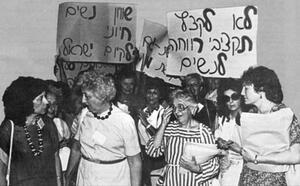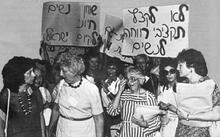Tamar Eshel
Courtesy of a private collection.
A lifelong diplomat with a strong record of defending women’s rights and human rights, Tamar Eshel joined the Israeli Foreign Ministry in 1950. In 1955 she was appointed to the Israeli delegation at the United Nations, where she became chairwoman of the UN Committee on the Status of Women in 1961. From 1970 to 1973 she served as chair of the Israel Council of Women’s Organizations, representing the country at international women’s conferences while serving as advisor to the mayor of Jerusalem. From 1974 to 1977 she chaired Na’amat, the women’s labor Zionist organization, and from 1977 to 1984 she served in the Knesset, focusing on immigration and the economy. In 1990 she was made an honorary citizen of Jerusalem in recognition of her service to the country.
Background
Descended on her mother’s side from a family of Bilu settlers who had come to Palestine in 1882, Tamar Eshel was born in London on July 24, 1920. Her lawyer father, Ze’ev Shoham (b. 1886 in Kurosvany, Russia–d. 1971), had studied at the university in St. Petersburg, where he first met his future wife, Zilla Feinberg (b. 1894 in Jaffa Palestine, d. 1988), before World War I. After the issuing of the Balfour Declaration in 1917, Ze’ev Shoham went via Sweden to London, where he was a member of the World Zionist Executive. Zilla joined him there on completing her studies in agriculture at the University of Berlin and the couple married in 1919, returning to Palestine in 1921. Zilla became a citrus grower in her father’s groves, eventually serving as a leading member of the Association of Citrus Growers in Palestine. A son, David, who was born in 1923, died in 2005. Although Tamar was born in the United Kingdom, Israel’s Foreign Minister Moshe Sharett later had her registered as a native of Israel, since her parents had been abroad as emissaries of the “state-in-the-making.”
In 1948 Tamar married Lionel Schwartz (1912–1962), an economist, and in 1949 bore a daughter, Yaël. In 1960, six years after divorcing her first husband, she married Arie Eshel, like herself an employee of the Israel Ministry of Foreign Affairs. She counts his daughter, Ruth, as her own.
Career
Tamar Eshel grew up in Haifa, where she studied at the Reali School and was active both in the Scout movement and in the Haganah. She attended the University of London, where she took Arabic and Middle Eastern Studies, and at the same time served as a radio operator at the Haganah’s illegal radio station. During World War II she volunteered for the British army and served first as a driver and then as a supervisor of the establishment of military educational libraries in the Middle East. In both London and Egypt, she was a counselor for the Habonim and He-Halutz movements. Upon discharge from the British army, she became an officer in the political and military intelligence service of the Haganah in Jerusalem and after the 1947 UN decision on Palestine was sent to Europe to engage in arms purchase and illegal immigration operations. She was in charge of Lit. "ascent." A "calling up" to the Torah during its reading in the synagogue.Aliyah Dalet in Marseilles and, after the pogrom in Oujda in June 1948, was sent to Algeria in order to organize the mass flight of Jews from Morocco and Algeria.
In 1950 Tamar joined the Israel Foreign Ministry, initially working in its research department and then as the manager of the office of the ministry’s director-general. In 1955 she was appointed a member of Israel’s permanent delegation at the United Nations and for many years represented Israel both at the UN General Assembly and in various other UN bodies, with the rank of ambassador. Among her areas of specialization were human rights and technical assistance. Elected to the UN Committee on the Status of Women, she became its chairwoman in 1961.
Eshel was twice seconded to the Prime Minister’s office: first from 1958 to 1960 as director of technical assistance, at a time when the US government was making such assistance massively available to Israel, and again from 1964 to 1967, when she served as secretary of the National Council for Research and Development.
In 1960, while her husband Arie Eshel served as Israel’s consul-general in New York, Tamar Eshel established the first office for Israeli academicians in the US and Canada. From 1962 to 1964, when he was ambassador to Brazil, she was put in charge of technical assistance between that country and Israel. After her husband’s death in 1968, while he was ambassador in Canada, she decided to concentrate her activities in Israel and served first as the Foreign Ministry’s adviser on political and church matters to Jerusalem’s mayor, Teddy Kollek. Thrice elected a member of the Jerusalem City Council, she served on the city’s executive, holding the education portfolio.
From 1970 to 1973 she served as chair of the Israel Council of Women’s Organizations, representing the country at numerous international women’s conferences, including the UN conferences on women in Copenhagen (1980) and Nairobi (1985). At the latter, she coordinated the activities of all the Jewish organizations that participated. She also served as vice president of both the International Council of Jewish Women and the International Council of Women’s Organizations.
From 1974 to 1977, Eshel served as chair of Na’amat and its world movement. From 1977 to 1984 she served as a Labor Party (Alignment) member of the ninth and tenth Knessets, where she was active in the committees on aliyah and absorption, the economy, interior policy and state comptroller, as well as on immigration from the Soviet Union and Ethiopia. She continued to travel abroad, lecturing in Jewish communities in North America, Europe and, though to a lesser extent, Latin America.
A recipient of numerous awards and honors, Tamar Eshel was declared an honorary citizen of Jerusalem in 1990.




